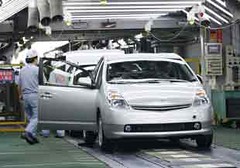
"Karoshi", a term used by Japanese workers that translates to "overworked to death" was the fate of 30-year old Kenichi Uchino, who collapsed and died at the Prius plant in "Toyota City", Japan. The court in Nagoya ruled the cause of death as exhaustion and noted that in the month leading to his death, Uchino had worked as much as 155 hours overtime, much of it unpaid.
This story and other unsettling details included in a report by the National Labor Committee in New York (NLC) casts a shadow on the labor practices of Toyota, the world's largest automobile manufacturer.
Paul Abowd, who picked up the story for In These Times, noted:
In its 65-page report released in June, NLC includes first-hand testimony of factory conditions in “Toyota City,” outside of Nagoya, Japan — less than 200 miles southwest of Tokyo — where the largest auto company in the world employs some 70,000 people.
The report alleges that Toyota exploits guest workers, mostly shipped in from China and Vietnam. According to the NLC, these workers are “stripped of their passports and often forced to work — including at subcontract plants supplying Toyota — 16 hours a day, seven days a week, while being paid less than half the legal minimum wage.” Workers are forced to live in company dormitories and deported for complaining about poor treatment, the report finds.
Both Abowd and the NLC recognized that Toyota's position in the auto industry hasn't been gained by a multitude of bad practices, but a growing trend toward undercutting the rights of the workforce by systematically lowering wages and introducing harsh work situations for temporary workers is steadily degrading the labor situation worldwide. Even in the U.S., where a middle class was born from comfortable automobile manufacturing jobs, Toyota's temporary worker practices are raising eyebrows.
In a rebuttal to the NLC report, Toyota responded:
Toyota is committed to being a good corporate citizen to all of our stakeholders, including our employees, partners, suppliers and customers. The NLC report contains numerous inaccuracies that present a false and misleading picture of our company. Contrary to the report’s allegations, Toyota respects its employees and honors the basic human rights of the people involved in our business. We comply with all applicable local laws and regulations wherever we operate while providing fair compensation and benefits.
However, many of the specific allegations in the NLC report went unanswered. We hope that Toyota takes its corporate responsibility seriously and addresses these labor issues in a transparent manner. Anyone driving around in a "green" Prius manufactured under questionable conditions should take Toyota to task and demand accountability and fairness for the way workers are treated.